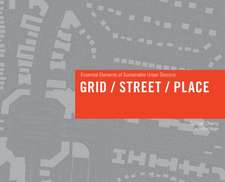Laws of the Landscape: How Policies Shape Cities in Europe and America: James A. Johnson Metro Series
Autor Pietro S. Nivolaen Limba Engleză Paperback – apr 1999
For decades, concerns have been raised about the consequences of relentless suburban expansion in the United States. But so far, government programs to control urban sprawl have had little effect in slowing it down, much less stopping it. In this book, Pietro S. Nivola raises important questions about the continued suburbanization of America: Is suburban growth just the result of market forces, or have government policies helped induce greater sprawl? How much of the government intervention has been undesirable, and what has been beneficial? And, if suburban growth is to be controlled, what changes in public policies would be not only effective, but practical?
Nivola addresses these questions by comparing sprawling U.S. metropolitan areas to compact development patterns in Europe. He contrasts the effects of traditional urban programs, as well as "accidental urban policies" that have a profound if commonly unrecognized impact on cities, including national tax systems, energy conservation efforts, agricultural supports, and protection from international commerce.
Nivola also takes a hard look at the traditional solutions of U.S. urban policy agenda involving core-area reconstruction projects, mass transit investments, "smart" growth controls, and metropolitan organizational rearrangements, and details the reasons why they often don't work. He concludes by recommending reforms for key U.S. policies--from taxes to transportation to federal regulations--based on the successes and failures of the European experience.
Brookings Metropolitan Series
Nivola addresses these questions by comparing sprawling U.S. metropolitan areas to compact development patterns in Europe. He contrasts the effects of traditional urban programs, as well as "accidental urban policies" that have a profound if commonly unrecognized impact on cities, including national tax systems, energy conservation efforts, agricultural supports, and protection from international commerce.
Nivola also takes a hard look at the traditional solutions of U.S. urban policy agenda involving core-area reconstruction projects, mass transit investments, "smart" growth controls, and metropolitan organizational rearrangements, and details the reasons why they often don't work. He concludes by recommending reforms for key U.S. policies--from taxes to transportation to federal regulations--based on the successes and failures of the European experience.
Brookings Metropolitan Series
Preț: 163.05 lei
Nou
Puncte Express: 245
Preț estimativ în valută:
31.20€ • 32.66$ • 25.82£
31.20€ • 32.66$ • 25.82£
Carte tipărită la comandă
Livrare economică 07-21 aprilie
Preluare comenzi: 021 569.72.76
Specificații
ISBN-13: 9780815760818
ISBN-10: 0815760817
Pagini: 142
Ilustrații: Illustrations
Dimensiuni: 152 x 229 x 10 mm
Greutate: 0.19 kg
Ediția:New.
Editura: Brookings Institution Press
Colecția Brookings Institution Press
Seria James A. Johnson Metro Series
ISBN-10: 0815760817
Pagini: 142
Ilustrații: Illustrations
Dimensiuni: 152 x 229 x 10 mm
Greutate: 0.19 kg
Ediția:New.
Editura: Brookings Institution Press
Colecția Brookings Institution Press
Seria James A. Johnson Metro Series
Notă biografică
Descriere
For decades, concerns have been raised about the consequences of relentless suburban expansion in the United States. But so far, government programs to control urban sprawl have had little effect in slowing it down, much less stopping it. In this book, Pietro S. Nivola raises important questions about the continued suburbanization of America: Is suburban growth just the result of market forces, or have government policies helped induce greater sprawl? How much of the government intervention has been undesirable, and what has been beneficial? And, if suburban growth is to be controlled, what changes in public policies would be not only effective, but practical?
Nivola addresses these questions by comparing sprawling U.S. metropolitan areas to compact development patterns in Europe. He contrasts the effects of traditional urban programs, as well as "accidental urban policies" that have a profound if commonly unrecognized impact on cities, including national tax systems, energy conservation efforts, agricultural supports, and protection from international commerce.
Nivola also takes a hard look at the traditional solutions of U.S. urban policy agenda involving core-area reconstruction projects, mass transit investments, "smart" growth controls, and metropolitan organizational rearrangements, and details the reasons why they often don't work. He concludes by recommending reforms for key U.S. policies--from taxes to transportation to federal regulations--based on the successes and failures of the European experience.
Brookings Metropolitan Series
Nivola addresses these questions by comparing sprawling U.S. metropolitan areas to compact development patterns in Europe. He contrasts the effects of traditional urban programs, as well as "accidental urban policies" that have a profound if commonly unrecognized impact on cities, including national tax systems, energy conservation efforts, agricultural supports, and protection from international commerce.
Nivola also takes a hard look at the traditional solutions of U.S. urban policy agenda involving core-area reconstruction projects, mass transit investments, "smart" growth controls, and metropolitan organizational rearrangements, and details the reasons why they often don't work. He concludes by recommending reforms for key U.S. policies--from taxes to transportation to federal regulations--based on the successes and failures of the European experience.
Brookings Metropolitan Series





















